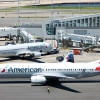Will Boeing crash shareholder value?

For half a century, maximising shareholder value has been the overriding objective of corporate governance, especially in the US and the UK. But Boeing's disastrous performance on product and customer safety may mean that change is in the air.
The crashes in 2018 and 2019 of Boeing's 737 MAX model, in which 350 people were killed, should have served as a wake-up call. But it was not until the blowout of a side door on a recent US flight that it became obvious to everyone that there is a fundamental problem with how Boeing is being run. Since then, AerCap—the world's largest aircraft leasing company and a major customer of Boeing—has demanded that financial targets "take a back seat," so that the company can focus 100 percent "on quality and safety metrics." Another customer, Emirates, has demanded that the company's next CEO be an engineer. And Boeing's largest union, the International Association of Machinists District 751, has demanded a board seat to "save this company from itself."
How did it come to this? For years, courts and academics have embraced shareholder value as the path to efficient management, as if focusing on this single goal and subjecting a company to the discipline of the market would reliably ensure top performance. Yet, corporate management is far too complicated a task to be guided by the stock ticker. Every day, executives must make difficult decisions about how best to balance financial goals with product quality and safety, labour conditions, environmental impact, and so forth.
What shareholder value has done is turn corporations into ATM machines. Corporate bosses embraced the concept because they could partake in lucrative shareholder bonanzas through stock-option plans and extra bonuses. Perhaps not surprisingly, these cash channels are often misaligned with actual company performance. How else could Boeing's CEO walk away with a 45 percent pay raise after causing even more damage to the company when he failed to fix its problems after the MAX crashes?
Pleasing shareholders with hefty dividends and share buybacks can all too easily undermine large business operations. But it wasn't always this way. In the early 17th century, a legal innovation, the "capital lock-in," created a basis for corporations to mobilise capital for large-scale investments by depriving investors of the opportunity to withdraw their money. With a more stable capital base, companies could borrow on a larger scale, and the market for shares became more liquid, because new investors did not have to fear that old ones would pull out.
The primacy of shareholder value turned shareholders into the pilots who steer companies. But portfolio investors have little interest in concerning themselves with the details of management. Their only concern is the bottom line. They lack a "firm commitment," as economist Colin Mayer of the University of Oxford puts it. And when these pilots' planes start to fall apart in midair, many will simply bail out and try their luck elsewhere.
But firms are more than just ATM machines. They pool resources, they innovate, and—perhaps most importantly—they solve problems. Contrary to the leading theory of the firm, which views the institution as a second best to markets (as merely a "nexus of contracts"), firms can do things that markets cannot do. As economists Albert Hirschman and Kenneth Arrow demonstrated, firms have the capacity to repair—to mend flaws when things go wrong, to improve their operations, and to find solutions to new complications.
What shareholder value has done is turn corporations into ATM machines. Corporate bosses embraced the concept because they could partake in lucrative shareholder bonanzas through stock-option plans and extra bonuses. Perhaps not surprisingly, these cash channels are often misaligned with actual company performance.
Prices may signal the need for repair, but actually doing the repair work requires much more. One must find the root cause of the problem and devise an effective and lasting fix. Stakeholders that can parachute away when things go wrong will not invest in repairs. They will choose "exit" over "loyalty" (in Hirschman's terms); and when they use "voice," they usually do so only to vote for directors who will advance their own interests.
For portfolio investors, the exit door is always kept open—if only by the company stepping in and buying back their shares. That means they are the most disloyal stakeholders of any business corporation. From their perspective, it does not even matter what goods the firm produces, except as a factor to be considered in building a well-diversified portfolio. Once they have pocketed their gains, they will get out, leaving behind an organisation that has sought to please investors by cutting costs, even when that has meant losing customers and valuable employees. As with planes, it is easy to crash a firm, but it takes much more time and resources to rebuild it.
Boeing's self-inflicted woes hold broader lessons. Once again, we see how the misguided idea of shareholder value can serve powerful financial interests while destroying what business organisations are best at. Firms excel not at blindly pursuing a single goal, but at pooling resources to solve complex problems, produce things of value, and reduce costs for society. This can be profitable, but making profit an end in itself is ultimately counterproductive. The "Boeing Effect" ought to remind us of that.
Katharina Pistor, professor of comparative law at Columbia Law School, is the author of 'The Code of Capital: How the Law Creates Wealth and Inequality.'
Views expressed in this article are the author's own.
Copyright: Project Syndicate, 2024
www.project-syndicate.org
Follow The Daily Star Opinion on Facebook for the latest opinions, commentaries and analyses by experts and professionals. To contribute your article or letter to The Daily Star Opinion, see our guidelines for submission.

 For all latest news, follow The Daily Star's Google News channel.
For all latest news, follow The Daily Star's Google News channel. 







Comments